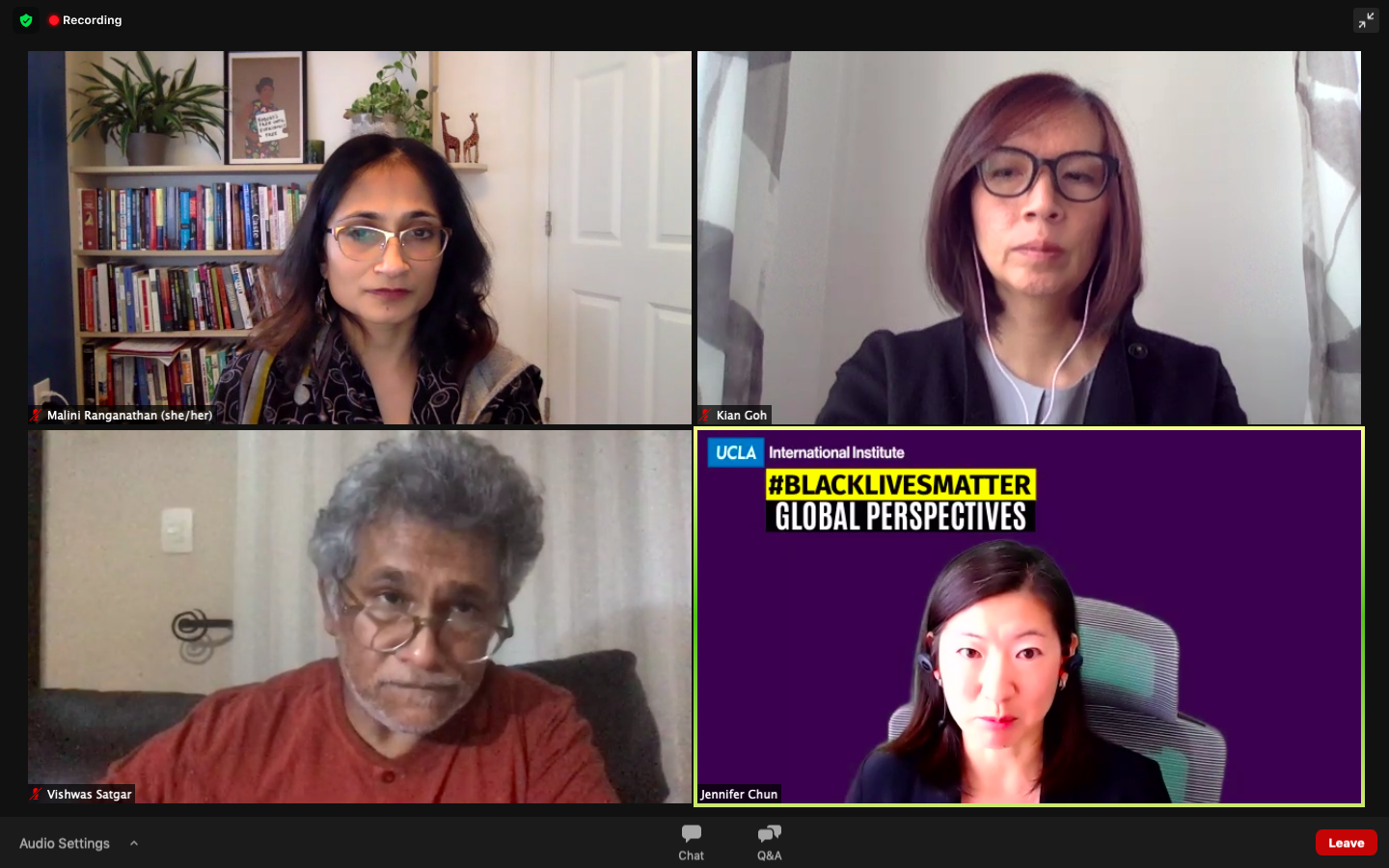Abolition and Climate Justice

Image Description: A screenshot of a zoom call shows four panelists: Dr. Malini Ranganathan, Dr. Vishwas Satgar, moderator and host Kian Goh, and host Jennifer Chun. Ranganathan’s zoom name includes her gender pronouns (she/her). They all have fairly serious expressions. Chun’s background is purple and reads “UCLA International Institute #BLACKLIVESMATTER GLOBAL PERSPECTIVES.” End description.
As the impact of climate change becomes more pressing, an intersectional analysis of the issue is essential. Historically marginalized people are most impacted by the early effects of climate change, while more privileged individuals have the luxury of procrastination.
As part of UCLA’s International Institute’s #BlackLivesMatter: Global Perspectives series, the institute held a webinar entitled “Abolitionist and Emancipatory Futures: Anti-Racist Struggles and Climate Justice,” hosted on Jan. 22, 2021. The institute brought in Dr. Malini Ranganathan and Dr. Vishwas Satgar to discuss the intersection of climate and racial justice, with a focus on Washington D.C. and South Africa respectively.
Ranganathan, an associate professor of International Service at American University, discussed the need for intersectional environmental justice. As she put it, “glossy” fixes (that is, those that do not address the heart of environmental issues, nor do they take into account historical knowledge and needs of marginalized people) fail to truly help. Abolitionist climate justice, which Ranganathan defines as “seek[ing] to dismantle infrastructures of racial violence that predispose certain groups to social and environmental vulnerabilities while reinvesting in systems of care, repair, and life,” is an inclusive — and ultimately more impactful — way of dealing with climate change and the ramifications that come with the changing environment. As previously stated, marginalized groups are most impacted by climate change. Policies must take action to rectify and protect marginalized peoples — an ideal of intersectional environmental justice is to center people in the fight for a healthier climate. To fail to do so is to fail at creating a just environmental movement.
Satgar, an associate professor of International Relations at the University of Witwatersrand Johannesburg and editor of the Democratic Marxism series, similarly emphasized the importance of finding decolonial ways of approaching environmental issues, specifically referencing the production and consumption of food. Looking to Indigenous environmental and agricultural practices can give us insight into ways of interacting with the land in a less harmful way. In a South African context, Satgar suggests re-establishing pre-colonial and pre-capitalist agriculture, though he does not subscribe to schools of thought which entirely disavow post-colonial knowledge for the worry of casting aside potentially useful knowledge and/or practices.
Satgar also discussed the role of capitalism in ecocide. Neoliberal forms of capitalism, while they may be slightly more progressive than conservative ideology, do not do enough to address the urgency of climate change — especially when capitalist interests, such as oil gained from fracking, come into play. Ultimately, the very institution of capitalism is culpable for ecocide. Such issues are also why Satgar and other South African activists do not seek to reproduce America’s response to the climate crisis, where policies are adopted to attempt to slow climate change, while failing to dismantle practices such as fracking and the building of pipelines because of fearing economic consequences. We must find solutions outside of what we currently know because our current efforts are neglectful at best. Satgar concluded with an emphasis on the abolition of ecocidal capitalism. If we do not end ecocidal capitalism, he explained, it will end us.
With the impacts of climate change already upon us, we must seek to protect the most vulnerable members of our society and find solutions to our unsustainable ways of life. Both Ranganathan and Satgar provide intersectional, anti-capitalist, abolitionist frameworks through which we can understand the climate crisis — and create a cleaner and more just world.




